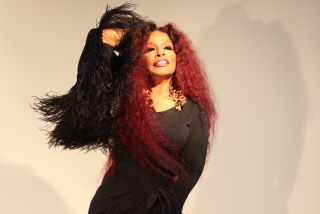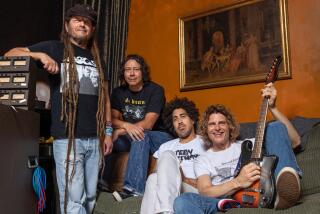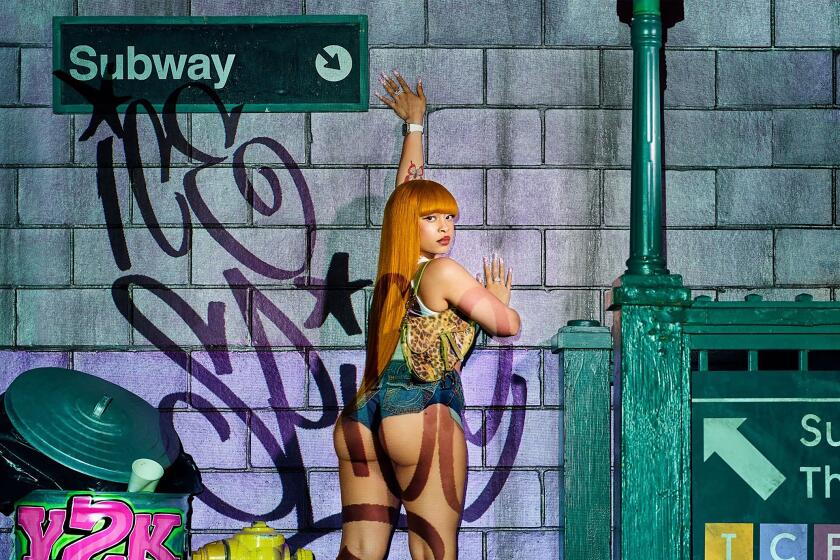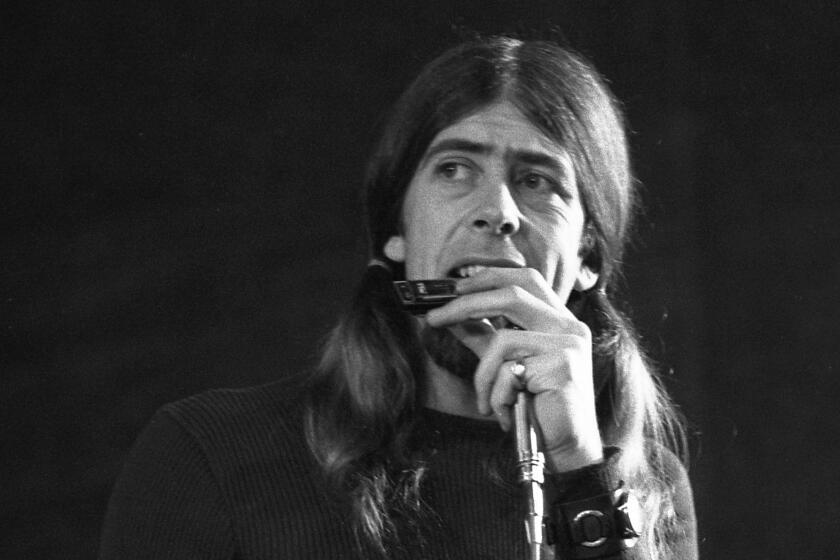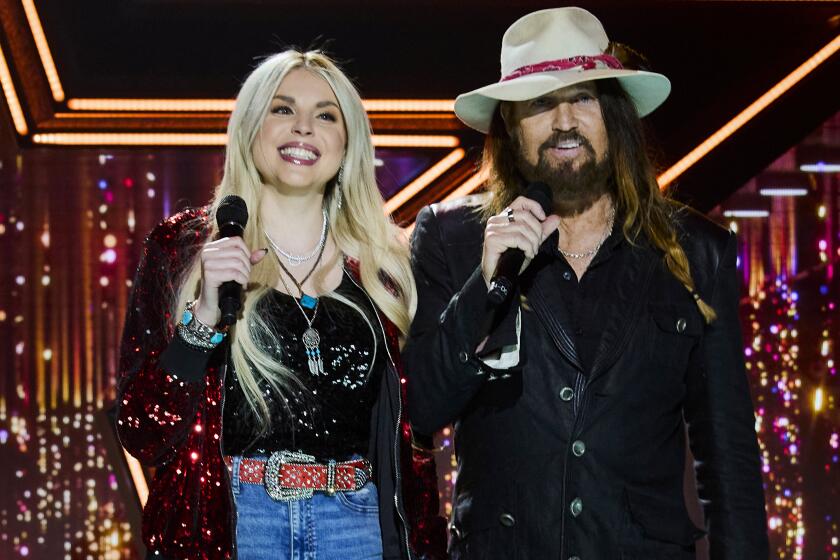Disillusioned but Still in Dylan’s Orbit : Music: A tour with folk-rock icon Bob Dylan gives Kevin Hunter pause. He will be with Wire Train at Coach House tonight.
The first thing Kevin Hunter of Wire Train did last week when he got home from a concert tour as Bob Dylan’s opening act was to listen to one of Dylan’s greatest albums, “Highway 61 Revisited.”
Wire Train’s lyricist and singer has shown a strong Dylan influence over the course of the band’s four albums, but he wasn’t trying to prolong the glow of having shared some 40 stages with a hero. Speaking over the phone recently, Hunter said it was more a case of trying to get a sour taste out of his mouth.
“I could still listen to (Dylan’s album), which was a real relief to me,” said Hunter, 31, who will front Wire Train tonight at the Coach House.
Speaking in cutting terms, Hunter said he considered Dylan’s performances during the recent tour aimless, listless and mercenary, and drew comparisons between Dylan and Elvis Presley during Presley’s declining days.
“I think I learned pretty quick that the guy who’s out there is not the guy who recorded ‘Highway 61’ or ‘Nashville Skyline,’ ” Hunter said.
The fact that Wire Train had been told it could not perform its scheduled set on the last night of the tour apparently helped fuel Hunter’s bitterness.
“It was a totally bizarre situation,” Wire Train’s manager, Robert Richards, said in a separate interview, adding that the band received no explanation why it couldn’t play. “It was one of the most unprofessional things I’ve ever seen in my career. (Wire Train’s members) were very disillusioned.”
(Dylan’s spokesman, Elliot Mintz, said the singer was unavailable over the Thanksgiving holiday and could not be reached for comment about Wire Train’s exclusion from the closing-night bill.)
Listening again to “Highway 61” at home in Los Angeles was a help, Hunter said. “I managed to save my respect for (Dylan’s) records. That’s the only way to still feel good about it.”
So much for the desirability of moving in the orbit of one’s idols (Hunter said Wire Train’s members had no substantial face-to-face contact with Dylan during the tour: “He keeps to himself mostly.”)
Still, the benefits of assimilating Dylan’s influence from afar are apparent on Wire Train’s new album.
There is a great deal of Dylan’s tone and phrasing in the heartbroken ballad, “If You See Her Go,” and in the plaintive ending of “All Night Living.” Wire Train also borrowed liberally from Dylan’s more rambunctious, humorous side with “Oh Me Oh My,” a loose, inebriated sing-along that echoes “Rainy Day Women” as it mocks self-appointed groups that want to stone rockers for not whitewashing their lyrics.
“The record was feeling kind of serious, so we decided to have a couple of comedy bits,” Hunter said. The lighthearted Dylan takeoff and a flighty bit of David Bowie mimicry served as bookends on either side of “Tin Jesus,” a dirge-like, nine-minute epic that bemoans how religion can be distorted into an oppressive force.
Hunter readily acknowledges that echoes from Dylan and other leading sources in rock’s past reverberate through Wire Train’s music.
“Hopefully (it’s) not to a degree where you’d say it was thievery.” But some of rock’s greatest innovators began by hewing closely to their influences, Hunter noted. “The Stones were just trying to do an exact copy of Muddy Waters. The Beatles were trying to rip off the Isley Brothers. Bob Dylan wanted to be Woody Guthrie. It’s in the accident of reproduction that a new style is found.”
On their current album, Hunter and Wire Train do a fine job of capturing a moment’s emotional essence in compact song sketches about relationships. The band is more self-conscious, and less successful, when straining for big, philosophic statements on “Tin Jesus” and “Dakota,” although both numbers are fiercely played.
Wire Train spent three years off the track before regrouping nine months ago to record its new album. The band hadn’t planned the long delay, Hunter said. After releasing a 1987 album, “Ten Women,” Hunter and the other members of Wire Train (guitarist Jeff Trott, bassist Anders Runblad and drummer Brian McLeod) had written and rehearsed new songs and were ready to record again. But conflicts arose with their record company, 415/Columbia, Hunter said, and the band went into a period of inertia as it tried to gain its release from its recording contract.
“It was all sort of industry posturing,” Hunter said. “Months would go by. It was just a mess.”
The silver lining, he said, was that each member of the band had the time to pursue individual interests. Hunter said he traveled in Italy and South America, then moved two years ago from San Francisco, where Wire Train was formed in 1980, to Los Angeles. During the band’s layoff, Hunter devoted himself to a couple of new crafts: making furniture and clothing.
Now that its enforced vacation is over, Wire Train has to contend with a musical world that has become increasingly harsh and competitive for emerging rock bands. It hardly helps that much of the audience base for a band like Wire Train, with its roots in the traditions of Dylan, Van Morrison and Neil Young, is looking backward instead of forward. When Tom Petty was a newcomer in the 1970s, he didn’t have to compete against expensive new boxed set retrospectives compiling his own heroes’ hits.
“It’s a strange time in music, where everybody’s trying to replace the old albums in their collection with CDs,” Hunter said. “I just try to do the best I can and leave all that to other people to figure out. We’re just working on things, getting up in the morning and writing some music or building something.”
One encouraging note from Wire Train’s tour with Dylan was the large number of young people in the audience. Hunter said the band members made a point of going into the audience after Wire Train had finished playing and talking to people in the crowd.
“The first five or 10 rows were all college professors who wanted to hear ‘Like a Rolling Stone’ again,” he said dismissively. “The rest were kids who’d been turned on to Dylan through the Grateful Dead and Tom Petty (both of whom backed Dylan on late-’80s tours). All these kids are telling me they’re listening to the Dead because rap is so incredibly misogynistic and metal is so violent. I can’t explain to you the numbers of kids who won’t listen to rap or metal because it’s manufactured and futile and violent, and it has nothing to do with what they want in their lives. If rock ‘n’ roll has any future, it lies with those kids.”
More to Read
The biggest entertainment stories
Get our big stories about Hollywood, film, television, music, arts, culture and more right in your inbox as soon as they publish.
You may occasionally receive promotional content from the Los Angeles Times.
